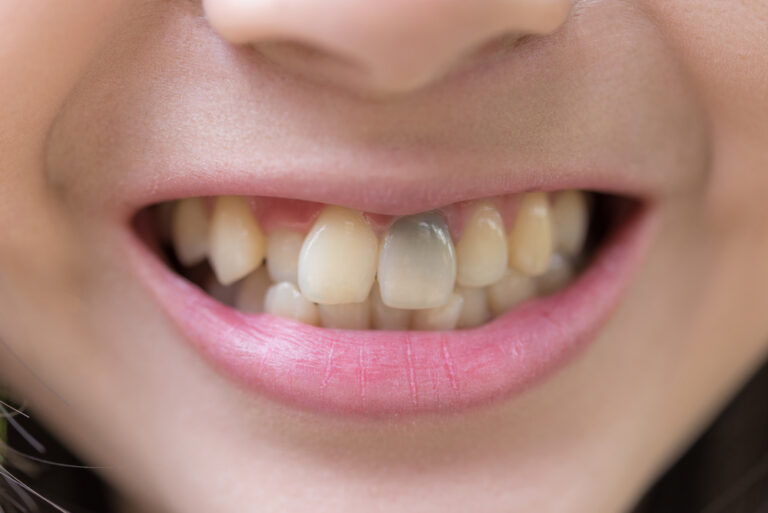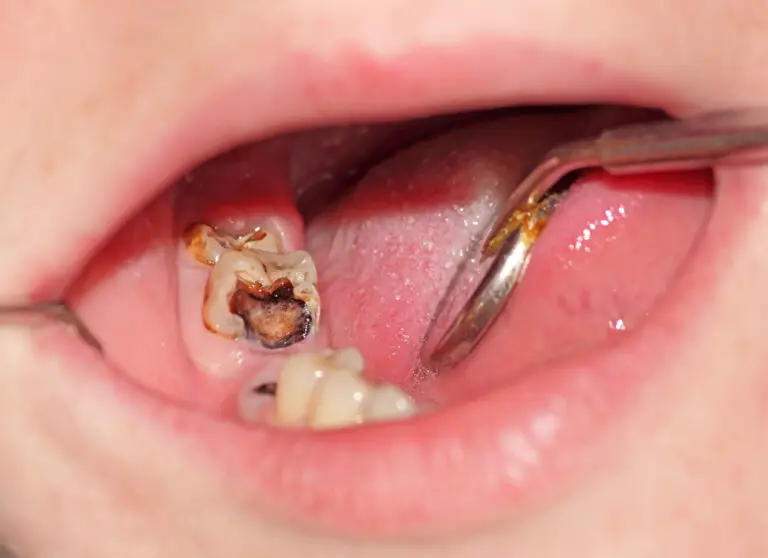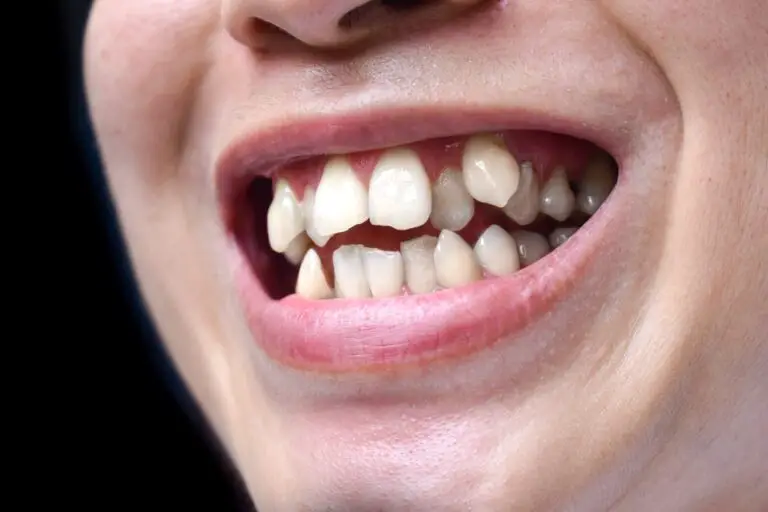If you’re experiencing tooth pain or swelling, you may be wondering if a tooth abscess can shrink on its own. A tooth abscess is a pocket of pus that forms due to a bacterial infection. It can occur near the tooth’s root or in the gums. If left untreated, it can lead to serious complications.
Unfortunately, a tooth abscess cannot shrink on its own. It requires treatment from a dental healthcare provider. The infection will not go away without intervention, and it may even spread to other parts of your body. It’s essential to seek treatment as soon as possible to prevent further damage and potential life-threatening consequences.
Understanding Tooth Abscess

If you’re experiencing tooth pain, swelling, or a fever, it’s possible that you have a tooth abscess. A tooth abscess is a pocket of pus that forms due to a bacterial infection. The abscess can occur in different areas of the tooth for different reasons. A periapical abscess occurs at the tip of the root, while a periodontal abscess occurs in the gums at the side of a tooth root.
Tooth abscesses are usually caused by untreated tooth decay, gum disease, or a cracked tooth. When bacteria enter the tooth and reach the pulp, they can cause an infection that leads to the formation of an abscess. If left untreated, the infection can spread to other parts of your body and become life-threatening.
The symptoms of a tooth abscess can include:
- Pain when you bite or chew
- Sensitivity to hot or cold temperatures
- Swollen gums
- A fever
- A bitter taste in your mouth
- Bad breath
- A swollen face or cheek
If you’re experiencing any of these symptoms, it’s important to see a dentist as soon as possible. They can diagnose your condition and recommend the appropriate treatment.
In some cases, a tooth abscess can shrink on its own. However, this is not a guarantee, and it’s not a recommended course of action. If you have a tooth abscess, it’s important to seek treatment to prevent the infection from spreading and causing further damage.
Can a Tooth Abscess Shrink on Its Own?
If you have a tooth abscess, you may be wondering if it will go away on its own. Unfortunately, the answer is no. A tooth abscess will not shrink on its own, and it can actually get worse over time if left untreated.
A tooth abscess is a pocket of pus that forms due to a bacterial infection. The infection can spread to the surrounding tissues and even to other parts of your body, causing serious health problems. It’s important to seek treatment as soon as possible to prevent complications.
While there are some home remedies that can help alleviate the symptoms of a tooth abscess, such as rinsing with salt water or applying a warm compress to the affected area, these remedies will not cure the infection. Only a dentist or doctor can properly diagnose and treat a tooth abscess.
Treatment for a tooth abscess may include draining the pus, prescribing antibiotics to fight the infection, or performing a root canal or tooth extraction. Your dentist or doctor will determine the best course of action based on the severity of your abscess and your overall health.
In summary, a tooth abscess cannot shrink on its own and requires prompt medical attention. If you suspect that you have a tooth abscess, don’t wait to seek treatment. Contact your dentist or doctor as soon as possible to prevent further complications.
Factors Influencing Abscess Shrinkage
When you have a tooth abscess, you may wonder if it will go away on its own. While it’s possible for an abscess to shrink or disappear without treatment, it’s not a guarantee. Several factors can influence whether an abscess will shrink or become more severe. Here are some of the factors that can affect abscess shrinkage:
Severity of the abscess
The severity of the abscess is one of the most significant factors that affect whether it will shrink or not. If the abscess is small and has not spread to the surrounding tissues, it may go away on its own. However, if the abscess is large and has spread to the surrounding tissues, it’s less likely to shrink without treatment.
Duration of the abscess
The duration of the abscess is another factor that can affect whether it will shrink or not. If the abscess has been present for a short time, it’s more likely to go away on its own. However, if the abscess has been present for a long time, it’s less likely to shrink without treatment.
Immune system
Your immune system plays a crucial role in fighting infections, including tooth abscesses. If your immune system is weak, it may be more challenging for your body to fight the infection, which can make it more difficult for the abscess to shrink.
Treatment
The type of treatment you receive can also affect whether the abscess will shrink. If you receive prompt treatment, such as a root canal or tooth extraction, the abscess is more likely to shrink. However, if you delay treatment, the abscess is more likely to become more severe and less likely to shrink on its own.
Underlying medical conditions
Underlying medical conditions, such as diabetes, can affect your body’s ability to fight infections. If you have an underlying medical condition, it may be more challenging for your body to fight the infection, which can make it more difficult for the abscess to shrink.
In summary, several factors can influence whether a tooth abscess will shrink on its own. If the abscess is small and has not spread to the surrounding tissues, it’s more likely to go away on its own. However, if the abscess is large and has spread to the surrounding tissues, it’s less likely to shrink without treatment. Prompt treatment, a strong immune system, and the absence of underlying medical conditions can increase the likelihood of abscess shrinkage.
Signs and Symptoms

If you have a tooth abscess, you may experience the following signs and symptoms:
- Severe, constant, throbbing toothache that can spread to your jawbone, neck or ear
- Pain or discomfort with hot and cold temperatures
- Pain or discomfort with the pressure of chewing or biting
- Fever
- Swelling in your face, cheek or neck that may lead to difficulty breathing or swallowing
You may also notice a bad taste in your mouth or a foul odor. In some cases, you may see pus draining from the affected tooth or gum.
It’s important to note that not all tooth abscesses cause pain. Some people may not experience any symptoms at all. However, even if you are not experiencing any discomfort, it’s still important to seek treatment as soon as possible to prevent the infection from spreading.
If you are experiencing any of the above symptoms, it’s important to schedule an appointment with your dentist as soon as possible. Your dentist will examine your tooth and may order an X-ray to determine the extent of the infection. Based on the severity of your condition, your dentist may recommend antibiotics, a root canal, or extraction of the affected tooth.
Ignoring a tooth abscess can lead to serious complications, including the spread of infection to other parts of your body. So, if you suspect you have a tooth abscess, don’t wait to seek treatment.
Risks of Untreated Tooth Abscess
Ignoring a tooth abscess can lead to severe complications, including:
- Spread of Infection: If left untreated, the infection can spread to other parts of your body, including your jaw, neck, and head. This can lead to potentially life-threatening conditions like sepsis, meningitis, or brain abscess.
- Tooth Loss: A tooth abscess can cause irreversible damage to your teeth, gums, and jawbone. If the infection spreads to the pulp of your tooth, it can lead to the death of the tooth root, requiring extraction.
- Chronic Pain: An untreated tooth abscess can cause persistent pain, swelling, and discomfort. This can affect your ability to eat, speak, and sleep comfortably.
- Weakened Immune System: Chronic infections can weaken your immune system, making you more susceptible to other infections and illnesses.
- Sinus Infections: A tooth abscess in the upper jaw can spread to your sinuses, causing sinusitis and nasal congestion.
- Cysts and Tumors: In rare cases, an untreated tooth abscess can lead to the formation of a cyst or tumor in your jawbone.
It is essential to seek dental treatment as soon as possible if you suspect you have a tooth abscess. Your dentist can diagnose the problem and provide appropriate treatment to prevent further complications.
Prevention and Care
Taking care of your teeth and gums is the best way to prevent tooth abscesses from occurring. Here are some tips to help you keep your mouth healthy:
- Brush your teeth twice a day with fluoride toothpaste
- Floss daily to remove plaque and food particles from between your teeth
- Use an antiseptic mouthwash to kill bacteria and freshen your breath
- Eat a healthy diet that is low in sugar and high in fruits and vegetables
- Avoid smoking and using tobacco products, as they can increase your risk of gum disease and tooth decay
- Visit your dentist regularly for checkups and cleanings
If you do develop a tooth abscess, it is important to seek treatment as soon as possible to prevent the infection from spreading. Here are some things you can do to care for your abscessed tooth:
- Rinse your mouth with warm salt water several times a day to help reduce swelling and pain
- Take over-the-counter pain relievers, such as ibuprofen or acetaminophen, as directed to help manage your pain
- Avoid eating hard or crunchy foods that could irritate your abscessed tooth
- Use a soft-bristled toothbrush to gently clean your teeth and gums
- Follow your dentist’s instructions for taking any prescribed antibiotics or other medications
Remember, a tooth abscess is a serious dental condition that requires prompt treatment. By taking good care of your teeth and gums and seeking treatment as soon as possible if you develop an abscess, you can help protect your oral health and avoid serious complications.
Professional Treatment Options

If you have a tooth abscess, it’s important to seek professional treatment as soon as possible. The goal of treatment is to get rid of the infection and prevent it from spreading to other parts of your body.
Here are some professional treatment options for a tooth abscess:
Incision and Drainage
Your dentist may need to make a small cut into the abscess to allow the pus to drain out. This is called incision and drainage. After the procedure, your dentist will clean the area with saline solution and prescribe antibiotics to prevent further infection.
Root Canal Treatment
If the infection has spread to the pulp of your tooth, your dentist may recommend a root canal treatment. During this procedure, your dentist will remove the infected pulp and clean the inside of your tooth. Then, they will fill the space with a special material and place a crown on top of your tooth to protect it.
Extraction
If your tooth is severely infected and cannot be saved, your dentist may recommend extraction. During this procedure, your dentist will remove the entire tooth and clean the area to prevent further infection.
Antibiotics
Your dentist may prescribe antibiotics to help fight the infection. It’s important to take the entire course of antibiotics as prescribed, even if you start feeling better before you finish the medication.
Pain Management
Your dentist may recommend over-the-counter pain relievers or prescribe stronger pain medication to manage the pain associated with a tooth abscess.
Remember, a tooth abscess won’t go away on its own. Seeking professional treatment is crucial to prevent the infection from spreading and causing further damage to your teeth and gums.
Home Remedies and Their Effectiveness
If you have a tooth abscess, there are some home remedies you can try to alleviate your symptoms. However, it is important to note that these remedies are not a substitute for professional dental treatment. Here are some home remedies and their effectiveness:
Saltwater Rinse
Rinsing your mouth with salt water is an easy and affordable option for temporary relief of your abscessed tooth. It can also promote wound healing and healthy gums. To use this remedy, mix 1/2 teaspoon of salt in a cup of warm water and swish it around your mouth for at least 2 minutes before spitting. Repeat this 2-3 times a day.
Baking Soda Rinse
Another remedy for dental abscess straight from your kitchen is baking soda. A mixture of baking soda and water eliminates and fights off plaque. To use this remedy, mix 1/2 teaspoon of baking soda in a cup of warm water and swish it around your mouth for at least 2 minutes before spitting. Repeat this 2-3 times a day.
Essential Oils
Essential oils, such as tea tree oil and clove oil, have natural antibacterial properties that can help fight off infection. To use this remedy, mix a few drops of essential oil with a carrier oil, such as coconut oil, and apply it directly to the affected area using a cotton swab. Repeat this 2-3 times a day.
Over-the-Counter Pain Relievers
Over-the-counter pain relievers, such as ibuprofen and acetaminophen, can help alleviate the pain associated with a tooth abscess. However, it is important to follow the instructions on the label and not exceed the recommended dose.
Tea Bags
Tea bags contain tannins, which have natural antibacterial properties that can help fight off infection. To use this remedy, steep a tea bag in hot water for a few minutes, then let it cool. Once it is cool enough to touch, place it on the affected area for 5-10 minutes. Repeat this 2-3 times a day.
Keep in mind that these home remedies are not a substitute for professional dental treatment. If you have a tooth abscess, it is important to see a dentist as soon as possible to prevent the infection from spreading or causing further damage.
Frequently Asked Questions
Can a tooth abscess go away without treatment?
No, a tooth abscess cannot go away without treatment. It requires the services of a dentist to drain the pus and remove the infection. If left untreated, the infection can spread to other parts of the body and cause serious health problems.
How long can a tooth infection go untreated?
A tooth infection can go untreated for a varying amount of time, depending on the severity of the infection. However, it is not recommended to leave a tooth infection untreated for any length of time, as it can spread and cause serious health complications.
What are the symptoms of a tooth infection spreading to other parts of the body?
If a tooth infection spreads to other parts of the body, it can cause symptoms such as fever, chills, nausea, vomiting, and difficulty breathing. In severe cases, it can even lead to sepsis, a life-threatening condition.
Can an abscessed tooth heal on its own?
No, an abscessed tooth cannot heal on its own. It requires professional dental treatment to drain the pus and remove the infection. Home remedies may provide temporary relief, but they cannot cure the infection.
How can I treat a tooth abscess at home?
Home remedies for tooth abscesses include rinsing your mouth with warm salt water, applying a cold compress to the affected area, and taking over-the-counter pain relievers. However, these remedies only provide temporary relief and should not replace professional dental treatment.
How long does it take for a tooth abscess to heal?
The healing time for a tooth abscess varies depending on the severity of the infection and the type of treatment received. In general, it can take several days to a few weeks for the abscess to heal completely after treatment. It is important to follow your dentist’s instructions for aftercare to ensure proper healing.







